Editors Observe: This article first appeared on The Struggle Horse, an award-winning nonprofit information group educating the general public on navy service. Subscribe to their publication.
It was horrifying each time it occurred, each time Kylie Briest’s father choked on his meals and began to show blue, each time her mother, Jenny, sprang out of her personal dinner chair to try the Heimlich maneuver on her husband.
Kylie misplaced depend of the variety of occasions she’d known as 911, making fast explanations to the operator whereas her thoughts was spinning within the background: questioning if her dad would survive this night time, hoping the neighbors have been residence so she might ship her little brother, Connor, over. That means Kylie might defend him from the issues she needed to see, and do, and marvel.
Kylie was solely 3 when a roadside bomb in Iraq left her father, Corey, with accidents so extreme they informed Jenny to plan his funeral. So this model of him — the model that may’t all the time swallow correctly, or see, or stroll on his personal, or communicate clearly — is all she’s recognized.
She’s grown up at his bedside, from the time she was a toddler serving to the nurses add Daddy’s treatment to his feeding tube to serving to carry his wheelchair up the steps of her sorority home on the College of South Dakota so he wouldn’t miss out on mother or father visitation day.
“That is simply life for us,” Kylie mentioned. “That is what we do.”
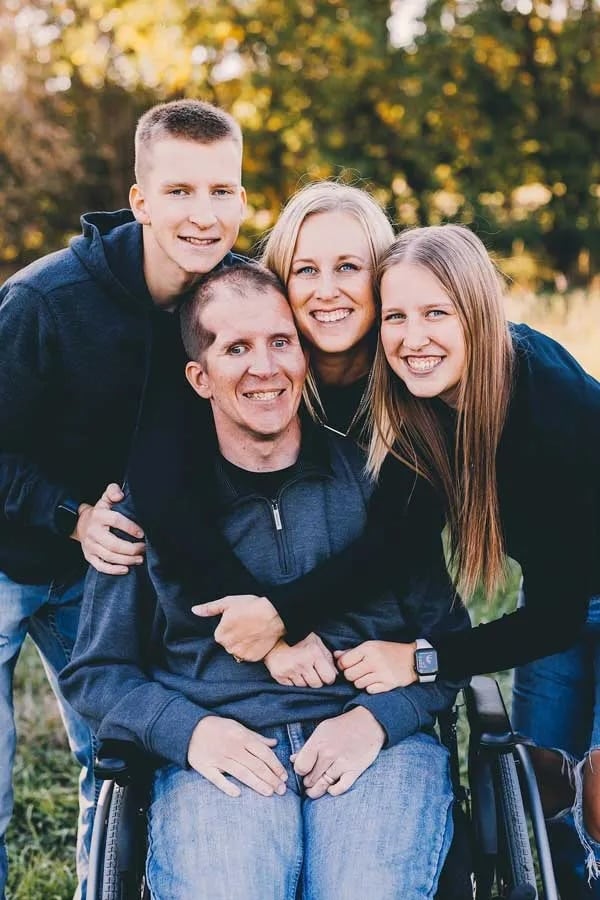
The expertise felt isolating, particularly when she was youthful. “Youngsters in school take a look at you otherwise simply because your dad exhibits as much as issues otherwise than their dad exhibits up,” she mentioned.
However Kylie wasn’t as alone as she thought. About 2.3 million American children live with a disabled veteran of their residence — a quantity researchers mentioned is probably going an undercount.
These injured service members and veterans are sometimes known as wounded warriors; their caregivers extra not too long ago earned the nickname hidden heroes.
And their youngsters? Those who babysit siblings throughout VA appointments; those who consolation their dad and mom, saying every part can be OK; those who clear the home or tiptoe round it whereas somebody is sleeping, or medicated or in a PTSD-triggered rage — they’re what the Elizabeth Dole Basis calls “hidden helpers.”
Regardless of their numbers, navy caregiving children are sometimes omitted of the dialog on how our nation takes care of those that served. They’re not often studied and infrequently excluded from help packages. There are few platforms designed to attach or inform them.
Now, President Donald Trump’s marketing campaign to slash federal spending is elevating alarm over long-held veterans providers and advantages — dampening the prospects for disabled veterans’ households already left behind.
The Struggle Horse got down to inform the tales of three of these households. The Briests reside in Yankton, South Dakota. Sisters Kimmy Repair and Delany White reside in North Carolina. And Rachel, Charlie, Mark, Michael and Molly are in Northern Virginia.
They needed to share their tales as a consolation to different hidden helpers and their households: to point out them they’re not alone and to hopefully make a distinction for those who come subsequent.
“All that we are able to do,” Kylie mentioned, “is proceed to attempt to make our tales and voices heard.”
Unseen, unrecognized, unsupported
Kylie doesn’t really feel cheated or robbed by destiny. She loves her household and her dad simply the best way he’s. “My dad has by no means been a burden,” she says. “He by no means can be.”
However she acknowledges that rising up, her path might have been made smoother. It could have been useful to have been supplied with counseling, she mentioned, and a few respite care that didn’t require admitting Corey to the VA an hour away for the day. A approach to join with children in comparable conditions.
“If I’d have had these connections sooner, I believe that might have made me a stronger particular person,” Kylie mentioned.
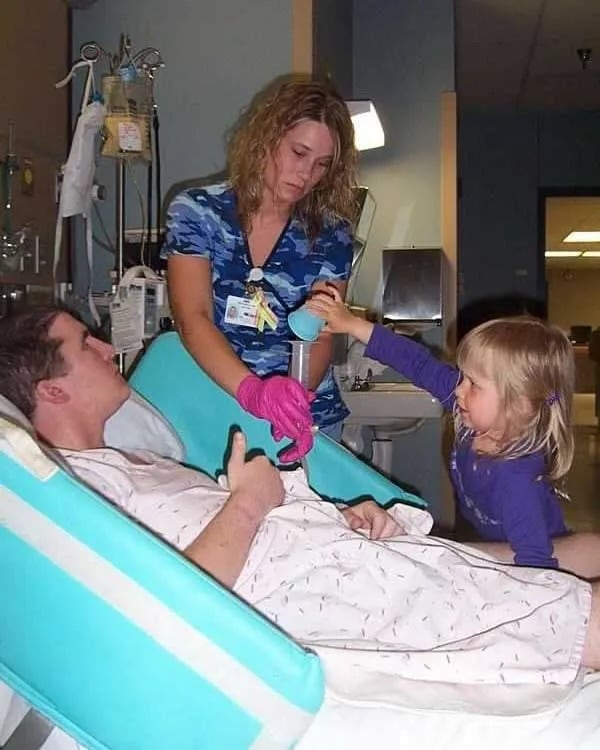
Hidden helpers present providers which can be “unseen, unrecognized and unsupported,” in response to the Elizabeth Dole Basis, one of many few organizations to concentrate on youngsters and younger siblings of wounded veterans.
It partnered with the analysis advisor Mathematica on a 2021 research that discovered these youngsters need extra help and have hassle getting it.
The dearth of formal help and connection comes at a social, emotional and psychological value, the restricted analysis into navy caregiving children discovered.
Youngster caregivers typically really feel stigmatized and remoted, have fewer social alternatives, expertise difficulties expressing emotion and studying in class and have extra well being issues comparable to stress, burnout and fatigue.
The stress of navigating a number of, advanced techniques and bureaucracies to get take care of a partner trickles all the way down to children within the family, taking a toll on their very own psychological well being and talent to focus and carry out in class, the report discovered.
There was a sluggish tradition shift throughout the VA of acknowledging the position of the household in caring for a wounded veteran, specialists say. Help, as soon as centered completely on the service member, is now extra prone to incorporate a caregiving partner or different main caregiver. However youngsters within the family stay largely missed.
“I’d say once we began [VA support] was veteran solely, like, there was no care on this planet for household in any respect,” mentioned Jenny Briest. “It’s taken time however they’re 1742660029 together with the caregiver.
“The youngsters? No. None. Nothing.”
Second place sibling
Kids who’re additionally caregivers are typically compelled to develop up a lot quicker, for higher or worse. The expertise of caring for a mother or father builds them into stronger, extra accountable individuals. However it might chip away at childhood.
“I do suppose typically we paint over the challenges by saying … it’s going to make them resilient, so subsequently every part’s OK,” mentioned Steven Malick, one of many Mathematica researchers who contributed to the report. “As if the expertise of trauma is in some way virtuous.”
Contemplate Delany White, an eighth grader who lives close to Raleigh, North Carolina. At 14, she’s one in all 9 children, however because the youngest by far, she seems like an solely little one. Apart from Kimmy.
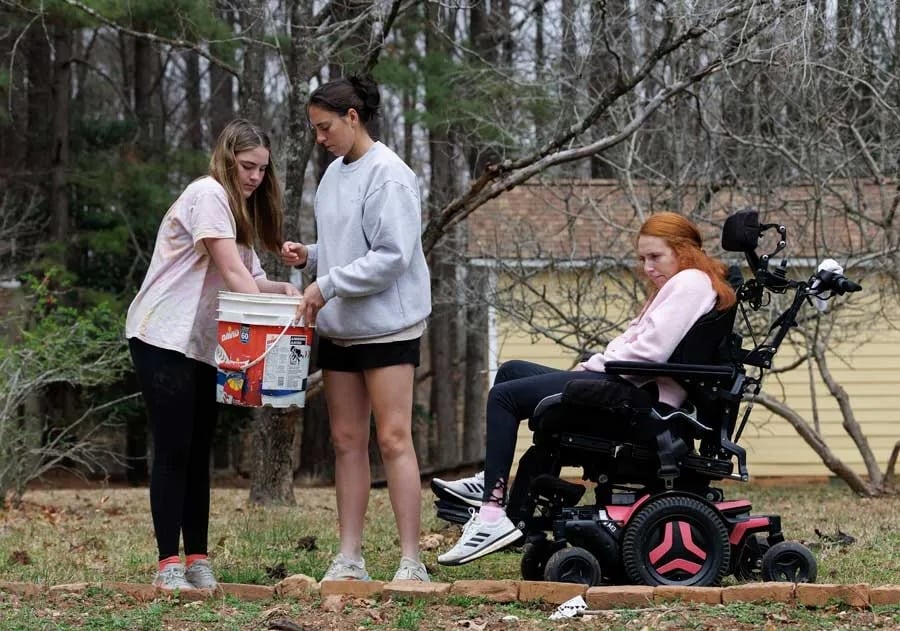
Kimmy Repair is 22 years older than her youngest sister, however their roles can really feel reversed. Once they prepare for church collectively, Delany does Kimmy’s hair and make-up. Delany additionally runs over an additional pair of pants if Kimmy wants them modified, holds her hand if she’s getting too aggravated and helps her switch out and in of her wheelchair.
Kimmy, a medical corps providers captain within the Military, was injured in a freeway accident on her means residence from a Hail and Farewell, shortly after coming back from a deployment to Afghanistan. She was in a coma for over a yr and emerged progressively, axon by axon it appeared to her massive household.
That was nearly 11 years in the past, when Delany was a toddler. She’s grown up serving to to handle her eldest sister.
There have been occasions Delany went to highschool exhausted as a result of Kimmy’s oxygen ranges had dipped in a single day and so they’d all been up, watchful and apprehensive. Typically she didn’t make it to highschool in any respect, as a result of her dad and mom wanted to take care of Kimmy and there would have been nobody to select her up.
“I really feel like having extra understanding academics or understanding admin in my college, but in addition having connections with different children who undergo the identical stuff, who possibly have the identical worries or the identical tasks, that might have made it quite a bit simpler,” Delany mentioned.
Delany knew it wasn’t true, however typically she felt like she was in second place when it got here to their dad and mom’ consideration. However she understood. Kimmy wanted them extra.
The coin-toss dad
For a lot of their childhoods, Mark and his half-brother Michael didn’t perceive the distinction in Charlie. The way in which he handled them, the best way he yelled, the unpredictability — it simply felt unfair.
It was all the time a flip of a coin as to which dad would present up that day. The one which spent hours having a catch within the yard might at any second get replaced by the dad who sunk into the beer-sticky funk of the basement sofa for days at a time, chucking empty cans into an overflowing trash bin.
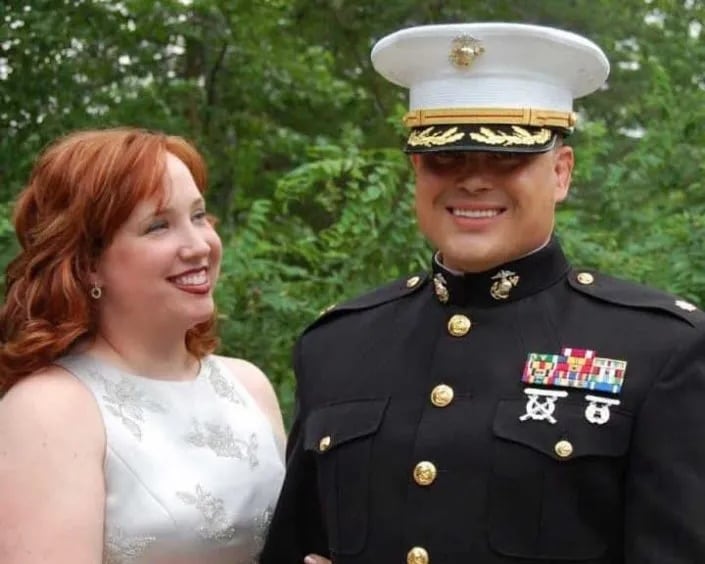
Charlie had been an energetic responsibility Marine, a multisport athlete, a bodybuilding champion on the College of South Carolina, a lawyer in two states, a firefighter and an adrenaline junkie who rode bulls for enjoyable.
However excursions in Afghanistan and Iraq left him with a traumatic mind harm, extreme PTSD and a busted backbone that induced continual ache. Again in Virginia, Charlie had sunk into alcohol abuse and melancholy.
Going out in public was like navigating a minefield. Any misperceived remark, any sudden motion, and Charlie might explode. Charlie’s household requested their final names not be revealed to guard their privateness.
“It took numerous a psychological toll on him, in my view, not having the ability to be the person that he was,” mentioned his stepson Mark, now 26.
It fell on Mark, he mentioned, to maintain the home as much as Charlie’s exacting requirements. Mark remembered being in elementary college and never being allowed to go to mattress till he completed the dishes, so he simply lay down beneath the eating room desk — a form of exhausted protest.
As he acquired older, Michael, who simply turned 18, taught himself to cook dinner beef and broccoli, butter hen and curries so the household wouldn’t need to eat Domino’s on days when his dad was too dispirited or couldn’t muster the power to make a meal.
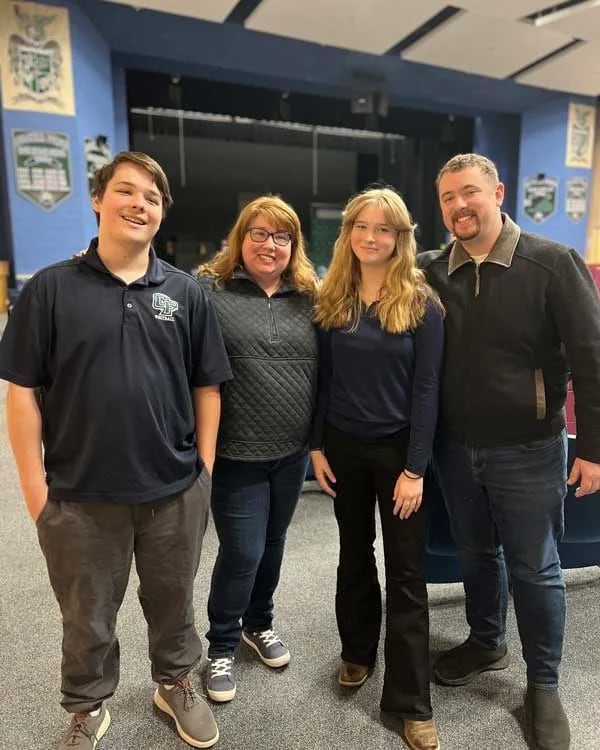
And as each boys acquired larger, they discovered learn how to defend Charlie from himself. Together with their sister,Molly, they discovered learn how to speak him down, distract him, lead him away or make themselves boundaries between Charlie and no matter risk he perceived.
The enemy could have existed solely in Charlie’s thoughts. However his children grew up studying learn how to struggle it.
Caring for invisible wounds
Younger caregivers mentioned they wished that they had higher details about their mother or father’s accidents, particularly with regards to invisible wounds like those Charlie struggles with that may have an effect on habits, cognition and feelings.
Michael mentioned having a greater understanding of PTSD and traumatic mind accidents would have helped him be extra understanding and empathetic. Now he thinks Charlie and veterans like him try to grip the model of themselves they was once — greedy at themselves however all the time closing their fists round shadows.
“These invisible wounds require an entire totally different sort of caregiving that I don’t suppose individuals are actually acknowledged for but,” mentioned their mother, Rachel.
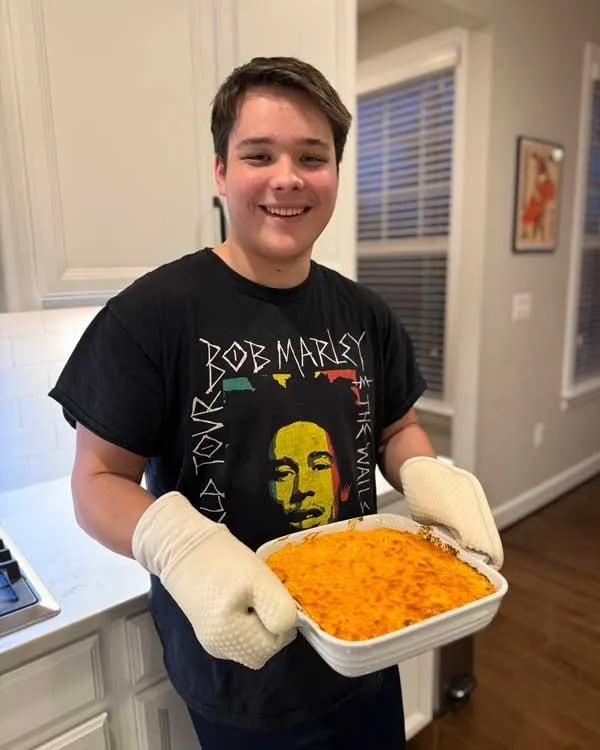
In reality, when she utilized to enroll in VA’s Program of Complete Help for Household Caregivers, focused towards veterans who want vital assist with self-care, she was denied.
“I don’t give him a shower, I don’t placed on his socks, however I do security and safety and so they discounted it utterly,” she mentioned. “I believe the VA must step up and handle their households.”
Bipartisan invoice nonetheless faces uphill battle
Neither of VA’s caregiver help packages embrace youngsters. A VA spokesperson wrote in January that there are not any plans to broaden their choices to succeed in hidden helpers, however identified {that a} proposed federal rule modifying this system Rachel had utilized to was open for public remark.
Army caregiving households didn’t weigh in en masse for inclusion of youngsters; by the point the general public remark interval closed, just a few of the rule’s 842 public feedback made point out of minors.
Hidden helpers do have some muscle behind them. Sens. Patty Murray, a Washington Democrat, and John Boozman, an Arkansas Republican, reintroduced the Serving to Heroes Act in late February, which might set up a household help program, designate household coordinators at each VA medical heart and assist join navy caregiving households with sources.
The act would additionally require the VA to gather knowledge on these households’ experiences, the higher to know and reply to their wants. Thus far, long-term knowledge doesn’t exist.
A spokesperson for the Elizabeth Dole Basis mentioned the act could be a “enormous deal,” requiring the VA, for the primary time, to focus on navy caregiving households with packages and providers.
“There may be bipartisan settlement that the VA can assist join these households with packages and networks that present precisely this sort of help and break down boundaries for these hidden helpers,” Boozman mentioned in an electronic mail to The Struggle Horse.
However with VA entangled in an enormous downsizing, there may be skepticism over the destiny of a invoice that’s being launched this session for a 3rd time.
‘Formed me for the higher’
Regardless of the various hardships of younger caregivers, they are saying their experiences have made them robust, compassionate and selfless.
Kylie Briest has made a occupation of caregiving. She graduated from the College of South Dakota in 2023 and works as a NICU nurse. She’s not simply good with the tiny infants who want her assist. She is aware of learn how to handle the entire household.
Her brother, Connor Briest, simply joined the identical Nationwide Guard unit their father was in. “He’s seen Dad sacrifice every part, he is aware of the price, and for him to nonetheless signal as much as be in the identical unit and to hold out that oath … I believe it’s fairly superior,” mentioned their mother, Jenny.
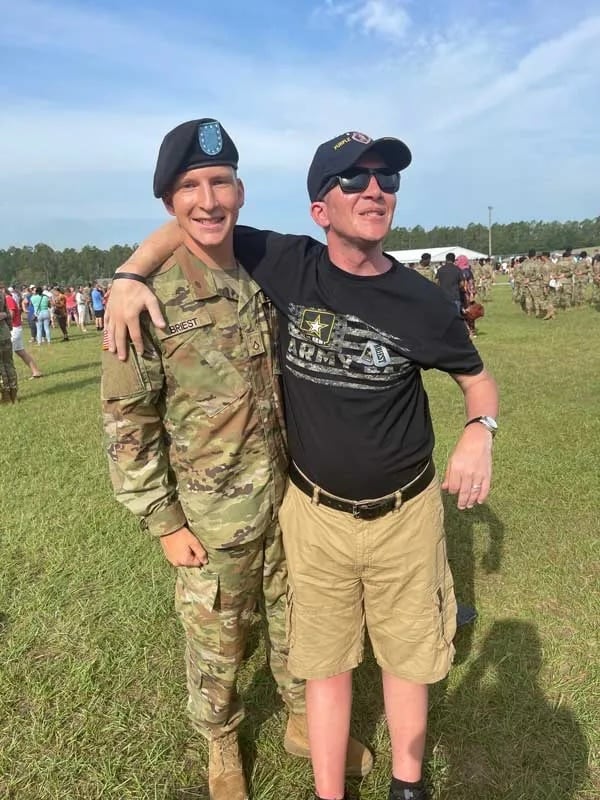
Delany in North Carolina mentioned caring for Kimmy has made her kinder, extra empathetic and extra observant — all the time primed to note if somebody wants assist. “I positively suppose it’s formed me for the higher,” she mentioned, “in a position to see that form of battle and now have the braveness to assist.”
In Virginia, Michael began a membership at his college for teenagers like him, who take care of wounded warrior dad and mom. He desires them to know they’re not alone.
Michael has been deeply affected by the facility of tales he’s heard from navy veterans like his dad, and he desires to play a task in maintaining them alive. Possibly he’ll train navy historical past, possibly he’ll be part of the struggle himself. He’s pondering of enlisting within the Navy.
“Somebody has to do it,” he mentioned.
That’s a motto he’s taken from caregiving. There may be dinner to cook dinner and dishes to scrub. There are tales to recollect and inform. There are individuals to handle. Somebody has to do it.
This Struggle Horse story was reported by Jennifer Brookland, edited by Mike Frankel, fact-checked by Jess Rohan, and copy-edited by Mitchell Hansen-Dewar. Hrisanthi Pickett wrote the headlines.











![Internship Opportunity at AGISS Research Institute [August 2024; Online; No Stipend]: Apply by August 9!](https://i2.wp.com/www.lawctopus.com/wp-content/uploads/2024/07/Internship-Opportunity-at-AGISS-Research-Institute-July-2024.jpg?w=120&resize=120,86&ssl=1)










